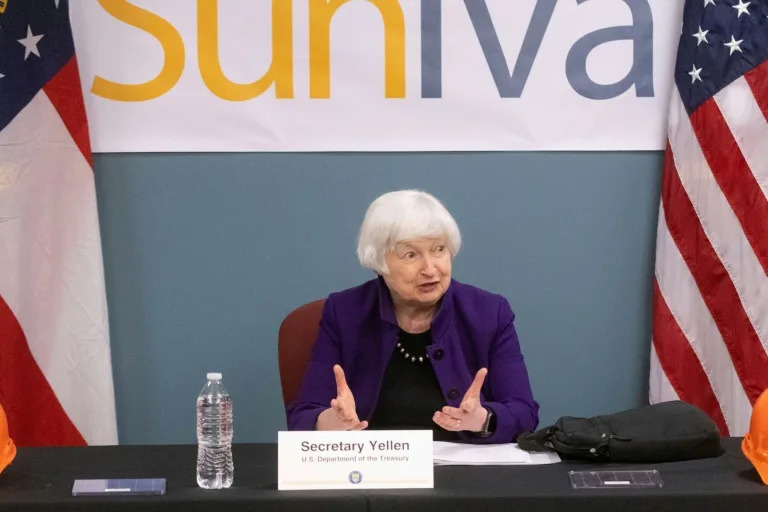A surge in cheap exports from China in industries like electric vehicles could create an oversupply and hurt economies, US Treasury Secretary Janet Yellen warned in a speech on Wednesday.
US Treasury Secretary Janet Yellen speaks during an event in Norcross, Georgia.
She plans to raise those risks during her next trip to China likely this year, and press Beijing to take "necessary steps to address this issue."
In her speech in the southern US state of Georgia, Yellen touted the benefits of President Joe Biden's landmark Inflation Reduction Act and highlighted major business investments that have been announced in response.
But she also raised concerns about the impact that China's excess industrial capacity could have on other countries.
Chinese government support in sectors like steel and aluminum in the past has "led to substantial overinvestment and excess capacity that Chinese firms looked to export abroad at depressed prices," Yellen said.
While this boosted production and employment in China, it "forced industry in the rest of the world to contract," she added.
"Now, we see excess capacity building in 'new' industries like solar, EVs, and lithium-ion batteries," Yellen noted.
The fear is that overcapacity could distort global prices and production, impacting companies and staff.
Yellen added that governments and businesses from other countries are also increasingly raising concerns.
"It is important to the president and me that American firms and workers can compete on a level playing field," said Yellen.
Yellen said she believes excess capacity also poses risks to China's own productivity and economic growth.
In a speech last December, Yellen called for Beijing to shift away from a state-driven approach in economic policy.
US companies have long complained about what they see as an unfair business environment in China.
On Wednesday, the Alliance for American Manufacturing (AAM) urged the US government to help prevent a deluge of Chinese imports.
"We must also ensure that Chinese companies don't simply use our trade partners as a back door to the American market, or to distort it by locating minor operations here dependent on the Chinese supply chain in a way that displaces our emerging industries," said AAM President Scott Paul.
China's industrial push risks destabilizing the global economy and watering down green-energy exports, Janet Yellen warns
-
US Treasury Secretary Janet Yellen warns that China's big industrial-production push could destabilize the global economy.
-
China's growing clean energy industry has oversupplied markets with cheap solar panels and EVs, she said in prepared comments that will be delivered on Wednesday.
-
"It is important to the president and me that American firms and workers can compete on a level playing field," Yellen said in speech text released by the Treasury.
China is flooding markets with a lot of cheap green energy products, and Treasury Secretary Janet Yellen is concerned about what it means for the global economy.
Yellen is set to speak at the Suniva solar cell factory in Norcross, Georgia on Wednesday, where she is expected to address concerns about China's export strategy.
"China's overcapacity distorts global prices and production patterns and hurts American firms and workers, as well as firms and workers around the world," a copy of Yellen's remarks reviewed by the New York Times said. "Challenges for individual firms can lead to concentrated supply chains, negatively impacting global economic resilience."
After suffering a sweeping property crisis, China is jump-starting its trying to jumpstart its economy with a strong industrial push, incentivizing investment in the manufacturing sector. And that policy shift includes a focus on clean energy. A recent report from the New York Federal Reserve shows the country is seeing a notable redistribution of credit, with a swift rise in new "green loans."
Last year, China's ballooning clean energy industry contributed to 40% of the country's economic growth.
But that comes with consequences. Yellen's remarks warn that this is history repeating itself, like when China overinvested in steel and aluminum, which promoted economic growth in the country but forced the industry in the rest of the world to contract.
This trend has already been manifesting in markets like that for solar panels. Solar panel prices have plunged 50% because of a substantial oversupply. In Europe, a glut of Chinese imports have pushed one of their largest solar module production sites to close. According to the IEA, China is set to account for 85% of the expansion of solar-module manufacturing capacity by 2028.
"It is important to the president and me that American firms and workers can compete on a level playing field," the excerpts reportedly said. "We have raised overcapacity in previous discussions with China, and I plan to make it a key issue in discussions during my next trip there."



